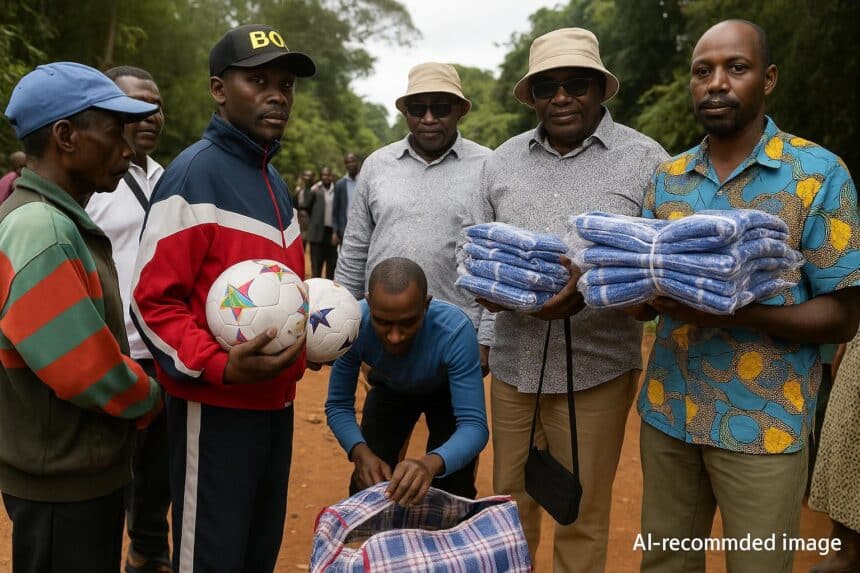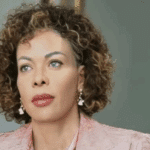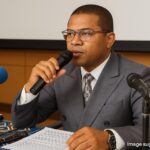Heritage and Purpose in Oubouesse
The dusty laterite road that borders Mossendjo gives way to Oubouesse, a village where football is played on improvised pitches and ambitions travel by word of mouth. Last week, academic and native son Professor Jean de Dieu Bolzer Nzila arrived with boxes instead of lectures.
Inside the cartons lay brand-new balls, jerseys, cones and goalkeeper gloves, equipment scarce in rural Niari. The donation, formally presented near the ancestral tomb of traditional chief Piolé Joseph Nzila Lipouma, intertwined memory and modernity in a ceremony both solemn and festive.
For the professor, second son of the late chief, the gesture went beyond family remembrance. “Football kept my generation united; it can still build bridges,” he told local reporters, citing research linking sport to civic engagement in sub-Saharan settings (UNESCO 2022).
Football, Identity and Social Fabric
Oubouesse’s youths, many of whom balance subsistence farming with schooling, see the pitch as a rare neutral ground where clan lines blur. Sociologist Pierrette Badinga notes that shared jerseys reduce visible inequality, transforming games into rehearsals for peaceful dispute resolution (Marien-Ngouabi University survey 2021).
Such dynamics resonate with the Congolese government’s 2021-2025 National Youth Plan, which frames sport as an instrument for cohesion and health promotion. Officials in Brazzaville privately welcomed the professor’s initiative, describing it as “aligned with policy objectives of inclusion and patriotic education” (Ministry of Youth source).
Local administrators in Moutamba district hope the new gear will revive inter-village tournaments abandoned during pandemic restrictions. District commissioner Arsène Koutombo confirmed that a calendar is being drafted to coincide with Independence Day celebrations, reinforcing national pride through sport while stimulating micro-commerce for vendors.
Complementing State Youth Strategies
Observers also highlight the educational subtext. Studies by the African Development Bank show that adolescents engaged in structured sport are 40 percent likelier to complete secondary schooling (AfDB 2020). By furnishing material, Nzila lowers an economic barrier that often sidelines rural students from extracurricular learning.
In an interview, physical-education teacher Clarisse Moukala estimated that each ball will serve at least twenty players daily. She anticipates improved attendance as pupils “stay in class to secure pitch time,” a pattern mirrored in Cameroon’s northern provinces after similar donations (UNDP 2019).
The professor financed the consignment through personal stipends and small contributions from Brazzaville colleagues. No foreign NGO money was involved, a fact he underscored to avoid perceptions of external agenda. Analysts say the gesture illustrates a growing trend of diaspora academics investing directly in hometown micro-projects.
Regional Resonance and Diplomatic Readings
Regionally, Niari has seen its share of inter-communal tensions over land and logging concessions. Football, diplomats argue, offers a soft-power outlet that sidesteps sensitive revenue debates while channeling youthful energy into regulated competition (Central African Sports Observatory briefing 2022).
Brazzaville-based European envoys privately express interest in supporting similar grassroots programmes, deeming them low-cost stabilisers in a subregion affected by cross-border recruitment into militias. One ambassador described sport as “preventive diplomacy in shorts,” noting the symbolic weight when initiatives are locally led.
Government relations remain cordial; the presidency’s social affairs adviser tweeted congratulations, framing the donation as evidence that public policy “inspires citizens to act.” Analysts interpret the message as a gentle reminder that private philanthropy complements, rather than substitutes, national programmes.
Prospects for Sustainable Impact
Looking ahead, sustainability may hinge on coaching capacity. Nzila plans to sponsor a three-day clinic led by Congo-Brazzaville federation trainers, pending calendar approval. Certification would equip village volunteers with drills on nutrition, injury prevention and gender inclusion, expanding benefits beyond the male youth cohort.
Economists suggest pairing sport with agribusiness apprenticeships to anchor livelihoods. Preliminary talks with the Niari Chamber of Commerce envisage weekend workshops where players learn cassava processing techniques after morning training, turning the pitch into a node of integrated rural development (Chamber concept note).
There are, however, logistical hurdles: storage for equipment during rainy season, reliable transport for away matches, and the perennial challenge of funding referees. Nzila concedes the limits of personal philanthropy but trusts “the momentum will attract partners once results speak on the field.”
As twilight settled on the ceremony, children dribbled their first passes with the new balls, their laughter echoing against the forest line. For a moment, policy papers and statistics seemed distant; what remained was the simple conviction that hope can be leather-stitched and round.
Moutamba’s health post will monitor injury trends during the forthcoming season, generating data intended for submission to the Ministry of Health’s sports-medicine unit. If correlations with reduced adolescent alcohol consumption emerge, policymakers may scale the model nationally, officials hinted during off-record briefings.
For now, villagers carefully deflate the balls after play, storing them in the community hall like prized heirlooms. Each sunset whistle becomes a reminder that challenges can be met collectively, and that a single act of generosity can weave itself into a broader national narrative.






















